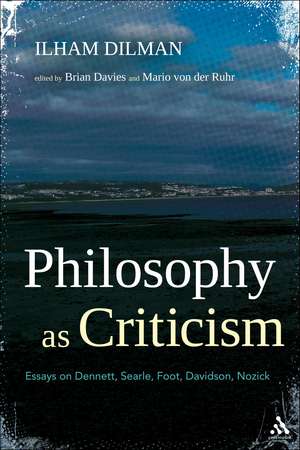Philosophy as Criticism: Essays on Dennett, Searle, Foot, Davidson, Nozick
Editat de Fr Brian Davies Autor Professor Emeritus Ilham Dilman Editat de Dr Mario von der Ruhren Limba Engleză Paperback – 18 mai 2011
| Toate formatele și edițiile | Preț | Express |
|---|---|---|
| Paperback (1) | 236.37 lei 6-8 săpt. | |
| Bloomsbury Publishing – 18 mai 2011 | 236.37 lei 6-8 săpt. | |
| Hardback (1) | 772.17 lei 6-8 săpt. | |
| Bloomsbury Publishing – 18 mai 2011 | 772.17 lei 6-8 săpt. |
Preț: 236.37 lei
Preț vechi: 272.52 lei
-13% Nou
Puncte Express: 355
Preț estimativ în valută:
45.23€ • 47.34$ • 37.65£
45.23€ • 47.34$ • 37.65£
Carte tipărită la comandă
Livrare economică 31 martie-14 aprilie
Preluare comenzi: 021 569.72.76
Specificații
ISBN-13: 9781441146915
ISBN-10: 1441146911
Pagini: 176
Dimensiuni: 156 x 234 x 15 mm
Greutate: 0.3 kg
Editura: Bloomsbury Publishing
Colecția Continuum
Locul publicării:New York, United States
ISBN-10: 1441146911
Pagini: 176
Dimensiuni: 156 x 234 x 15 mm
Greutate: 0.3 kg
Editura: Bloomsbury Publishing
Colecția Continuum
Locul publicării:New York, United States
Caracteristici
Each chapter is devoted to a different thinker and branch of philosophy
Notă biografică
Ilham Dilman (1930-2003) was Professor Emeritus and Honorary Fellow, Department of Philosophy, University of Wales Swansea. He was perhaps most well known for his contributions to moral philosophy and psychology, and in particular on the works of Wittgenstein and Freud. His publications include Wittgenstein's Copernican Revolution (Palgrave, 2002), Free Will: A Historical and Philosophical Introduction (Routledge, 1999), Existential Critiques of Cartesianism (Macmillan, 1993), and Freud and Human Nature (Blackwell, 1983). Brian Davies is Professor of Philosophy at Fordham University, New York, USA. His publications include An Introduction to the Philosophy of Religion (Oxford University Press, 3rd edition, 2003) and The Thought of Thomas Aquinas (Oxford University Press, 1992).
Cuprins
Editorial PrefaceIntroduction1. Dennett's Explanation of Consciousness2. John Searle's Defence of Realism3. Philippa Foot on Natural Goodness4. Donald Davidson I: Human Agency, Action and Intention5. Donald Davidson II: A Philosophy of Psychology, The Mental and the Physical6. Robert Nozick's Philosophical MeditationsClosing RemarksBibliography
Recenzii
"This is vintage Dilman. This book could give a new vitality to an unexploited genre: philosophical criticism. Of course, philosophers have always critiqued other philosophers, but a volume of systematic criticism by a single philosopher of various philosophical works is rare. The particular strength of this volume is that it provides a concentrated and textured expression of the author's own philosophical stance, while at the same time offering new scrutiny of the philosophers evaluated. Dilman invariably shakes the reader out of any complacent reading of Dennett, Searle, Foot, Davidson and Nozick, sometimes to the point of prompting a radical questioning of their current status." -- Daniele Moyal-Sharrock, Senior Lecturer in Philosophy, University of Hertfordshire, UK
"Ilham Dilman's last book of essays, written when he was dying, is, like all his works, honest, sincere, and written with luminous clarity. When he learnt that he had terminal cancer, he selected five books by five leading philosophers of the day, read them carefully and wrote critical essays about them. Philosophy, Dilman held, is above all, criticism. This is patent in these essays on Dennett, Searle, Foot, Davidson and Nozick. Each essay consists in a meticulous outline of the salient claims of the book under consideration, followed by critical observations. Dilman's final reflections are often profound, sometimes very touching, and always worth reading. His voice will be missed." -- Peter Hacker, Emeritus Research Fellow, St John's College, University of Oxford
"Ilham Dilman's last book of essays, written when he was dying, is, like all his works, honest, sincere, and written with luminous clarity. When he learnt that he had terminal cancer, he selected five books by five leading philosophers of the day, read them carefully and wrote critical essays about them. Philosophy, Dilman held, is above all, criticism. This is patent in these essays on Dennett, Searle, Foot, Davidson and Nozick. Each essay consists in a meticulous outline of the salient claims of the book under consideration, followed by critical observations. Dilman's final reflections are often profound, sometimes very touching, and always worth reading. His voice will be missed." -- Peter Hacker, Emeritus Research Fellow, St John's College, University of Oxford
